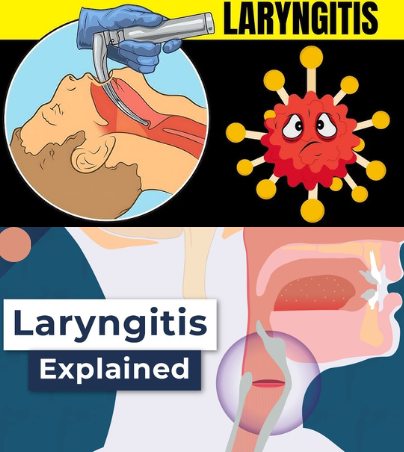
What Is Laryngitis?
Laryngitis is the inflammation of the larynx, commonly known as the voice box. This small but powerful part of your throat contains the vocal cords, which vibrate to produce sound. When they get swollen or irritated, your voice may sound hoarse, raspy, or even disappear completely. Most of us have experienced losing our voice after a cold, a night of shouting at a concert, or a stressful work presentation—that’s laryngitis in action.
Why Does Laryngitis Happen?
So, what really causes this frustrating condition? It often starts with something simple, but multiple factors can make it worse:
- Viral infections – The most common culprit, often linked to colds or flu.
- Bacterial infections – Less frequent but more severe, needing medical attention.
- Overusing your voice – Teachers, singers, or public speakers often strain their vocal cords.
- Allergies and irritants – Smoke, dust, and chemicals can inflame the throat.
- Acid reflux (GERD) – Stomach acid rising into the throat irritates the vocal cords.
- Chronic conditions – People with sinusitis or asthma may experience recurring bouts.
Think of your vocal cords as guitar strings—when overused, they get out of tune and stop producing clear sound.
Recognizing the Symptoms of Laryngitis
The signs are usually easy to spot, but many people mistake them for a common sore throat. Here’s what to look out for:
- Hoarseness or a raspy voice.
- Loss of voice or reduced vocal range.
- Sore throat or tickling sensation.
- Dry cough that lingers.
- Difficulty speaking loudly or clearly.
- Swelling and discomfort in the throat.
Symptoms that last more than two weeks may indicate a chronic issue that requires medical evaluation.
Video : Laryngitis: Everything You Need to Know
The Difference Between Acute and Chronic Laryngitis
Not all cases are the same. Laryngitis falls into two main categories:
- Acute laryngitis – Short-term, usually caused by infection or strain. Symptoms improve within one to two weeks.
- Chronic laryngitis – Lasts longer than three weeks. Often linked to smoking, acid reflux, or long-term exposure to irritants.
While acute laryngitis is like a temporary power outage, chronic laryngitis is a recurring electrical problem—it needs deeper investigation and repair.
How Laryngitis Affects Your Daily Life
Losing your voice might sound trivial, but it can affect communication, work performance, and even emotional health. Imagine a singer unable to perform, or a teacher struggling to lecture. For many professionals, their voice is their livelihood. Even for others, the inability to speak clearly can be frustrating and isolating.
Effective Treatment Options
The good news is, laryngitis often improves with rest and care. Treatment depends on the cause:
- Viral infections – Usually heal on their own; rest and hydration help.
- Bacterial infections – Antibiotics may be prescribed.
- Voice rest – Avoid shouting, whispering, or prolonged speaking.
- Hydration and humidifiers – Moist air soothes inflamed vocal cords.
- Medications – Anti-reflux drugs, antihistamines, or corticosteroids may be used in specific cases.
In severe or chronic cases, doctors may refer patients to an ear, nose, and throat specialist (ENT) for further evaluation.
Home Remedies That Actually Help
If you want quick relief, try these simple remedies:
- Sip warm water, herbal teas, or honey lemon drinks.
- Gargle with warm salt water to reduce swelling.
- Avoid caffeine and alcohol, which dehydrate the throat.
- Inhale steam to keep vocal cords moist.
- Rest your voice—yes, that means less talking and no yelling.
These natural tricks won’t cure infections, but they create a healing environment for your voice to recover.
When to Seek Medical Help
Not every hoarse voice needs a doctor, but some warning signs shouldn’t be ignored:
- Persistent hoarseness beyond two weeks.
- Severe throat pain or difficulty swallowing.
- Coughing up blood.
- Trouble breathing.
- Voice changes in children that interfere with breathing or feeding.
These could signal more serious conditions such as vocal cord nodules, polyps, or even throat cancer.
Prevention Tips for Healthy Vocal Cords
Want to keep your voice clear and strong? Prevention is key:
- Stay hydrated – Water keeps vocal cords flexible.
- Avoid smoking – Cigarettes irritate and damage the throat.
- Warm up your voice – Just like athletes stretch before exercise, singers and speakers should warm up before heavy use.
- Limit shouting – Use a microphone when speaking to large groups.
- Manage acid reflux – Avoid late-night meals and spicy foods if reflux is a problem.
Video : Laryngitis treatment (plus 4 home remedies)
Conclusion: Protecting Your Voice Matters
Laryngitis may seem like a temporary inconvenience, but it teaches us just how much we rely on our voices every day. By understanding the causes, recognizing the symptoms, and practicing preventive care, you can keep your voice strong and healthy. Whether you’re a teacher, singer, or simply someone who loves to chat, treating your voice with care ensures it’s always there when you need it most.


